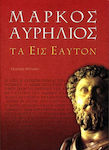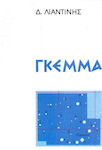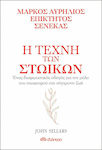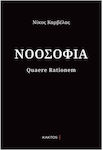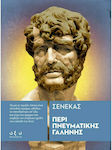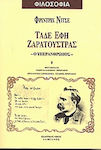Skroutz Buyers Protection
Ο Χάμπερμας και οι νεοαριστοτελικοί, Η ηθική του διαλόγου στον Γιούργκεν Χάμπερμας και η πρόκληση του νεοαριστοτελισμούCode: 130888
- Author: Γκόλφω Μαγγίνη
- Publisher: Patakis
- Μορφή: Soft Cover
- Έτος έκδοσης: 2006
- Αριθμός σελίδων: 414
- Κωδικός ISBN-13: 9789601619439
- Διαστάσεις: 24×17
Γκόλφω Μαγγίνη

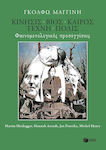

Philosophy Books
Για μια ερμηνευτική του τεχνικού κόσμου, Από τον Χάιντεγκερ στη σύγχρονη τεχνοεπιστήμη
from 19,45 €Added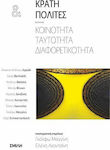
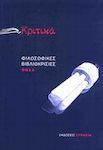
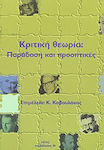
Similar products
All shops
Prices are calculated for:Luxembourg, Other Payment Options
- 20,64 €
- 19,25 €
- 24,38 €
- 18,50 €
- 27,50 €
- 20,62 €
- 19,25 €
Description
On September 9, 2000, Jürgen Habermas gave a speech at the University of Zurich on the occasion of the Dr. Magrit Award. In his speech, he made a distinction between a Kantian theory of justice and an existential ethics, as found in Kierkegaard. The latter testifies to a "post-metaphysical ethos," as it responds to the question of how to live a good life with the "ability to be oneself." What assumption does Habermas start from? It is the idea that, in the conditions of late modernity, it is neither possible nor desirable to demand comprehensive answers from the philosopher about what ultimately constitutes a successful, good life, in contrast to a failed life. Questions about the good life - "How should a human being handle the time of their life?" and even more so, "How should I handle the time of my life?" - do not belong to the field of philosophical ethics. The "ethical" questions require the development of a comprehensive, self-sufficient worldview, which includes and seems to find certain answers. For Habermas, the role of philosophy in our time is different. He approaches what Adorno calls on the first pages of Minima Moralia "a melancholy science."
Golfo Maggini here attempts a comprehensive consideration of the relationship between two dominant "examples" in the field of contemporary practical philosophy: on the one hand, the ethics of dialogue in Jürgen Habermas and, on the other hand, a series of neo-Aristotelian and neo-Hegelian ethical theories with which it is opposed. By dealing with the historical-philosophical and systematic -epistemological, normative, ideological- parameters that govern this confrontation, the author highlights its richness and scope. She deals with issues that are at the heart of crucial concerns of modern societies, such as the relationship between modernity and tradition, multiculturalism and the pluralism of values, as well as issues of personal ethics, such as the power of the principle of autonomy and the demands of authenticity.
Specifications
- Subtitle
- The Ethics of Dialogue in Jürgen Habermas and the Challenge of Neo-Aristotelianism
- Format
- Soft Cover
- Number of Pages
- 414
- Publication Date
- 2006
- Dimensions
- 24x17 cm
Important information
Specifications are collected from official manufacturer websites. Please verify the specifications before proceeding with your final purchase. If you notice any problem you can report it here.


































